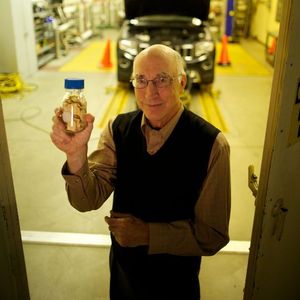UCR researchers win funding for biofuel, biochemical development




University of California, Riverside
May 16, 2016
BY Sarah Nightingale, University of California, Riverside
Charles Wyman, distinguished professor in chemical and environmental engineering and holder of the Ford Motor Co. chair in environmental engineering at the Center for Environmental Research and Technology (CE-CERT), and Charles Cai, research engineer at CE-CERT and adjunct assistant professor, both at the University of California, Riverside’s Bourns College of Engineering, have received a $1.3 million award from the USDA that will fund research on developing commercially viable processes to create biofuels and chemicals from waste plant materials.
The award will support a project that aims to convert poplar wood into ethanol and polyurethanes based on novel platforms for pretreatment and lignin polymer synthesis. The patented method used by the Wyman/Cai team, called co-solvent enhanced lignocellulosic fractionation (CELF), was developed as a versatile and efficient way to convert raw agricultural and forestry residues and other plant matter into both biofuels and chemicals.
Partnering with the University of Tennessee Knoxville and MG Fuels LLC, this UCR project aims to bring industry closer to producing fuels and chemicals from biomass at high enough yields and low enough costs to become a viable alternative or replacement for petroleum-based fuels and chemicals. The current research project is expected to increase revenue for biorefineries and offset pretreatment costs to improve overall process economics.
Advertisement
Advertisement
“This project takes advantage of the unique ability of our novel CELF technology to effectively fractionate lignin from low-cost non-food sources of cellulosic biomass such as agricultural and forestry residues for conversion into polyurethanes that increase revenues for biorefineries while also enhancing ethanol yields,” Wyman said. Wyman leads a team of researchers at UCR’s CE-CERT who are advancing technologies for conversion of cellulosic biomass into sustainable transportation fuels.
UCR was one of seven institutions selected May 9 to receive a share of the $10 million joint investment by the USDA’s National Institute of Food and Agriculture and the U.S. Department of Energy towards research that will drive more efficient biofuels production and agricultural feedstock improvements.
These awards were made through the Biomass Research and Development Initiative, a joint program run by NIFA and DOE to develop economically and environmentally sustainable sources of biomass and increase the availability of renewable fuels and biobased products, helping to replace the need for gasoline and diesel in vehicles, and diversify our nation’s energy choices.
Advertisement
Advertisement
“Advancements in bioenergy research will help protect our national energy security, reduce pollution, and bolster our energy supply,” said Cathie Woteki, under secretary for USDA’s research, education and economics mission area, in a statement. “Producing more renewable and biobased energy can also revitalize rural communities with a new economic market and provide farmers a profitable and sustainable investment through on-farm energy resources.”
The USDA funded projects at UCR, the University of Montana; Dartmouth College; State University of New York; and North Carolina Biotechnology Center. The DOE funded projects by Ohio State University and the Massachusetts Institute of Technology.
Related Stories
The U.S. Department of Energy Bioenergy Technologies Office (BETO) announced up to $23 million in funding to support research and development (R&D) of domestic chemicals and fuels from biomass and waste resources.
The U.S. DOE has announced its intent to issue funding to support high-impact research and development (R&D) projects in two priority areas: sustainable propane and renewable chemicals and algal system cultivation and preprocessing.
Sens. Sherrod Brown, D-Ohio, and Pete Ricketts, R-Neb., in August introduced the Renewable Chemicals Act, a bill that aims to create a tax credit to support the production of biobased chemicals.
The Chemical Catalysis for Bioenergy Consortium, a consortium of the U.S. DOE’s Bioenergy Technologies Office, has launched an effort that aims to gather community input on the development of new biomass processing facilities.
USDA on March 8 celebrated the second annual National Biobased Products Day, a celebration to raise public awareness of biobased products, their benefits and their contributions to the U.S. economy and rural communities.
Upcoming Events










